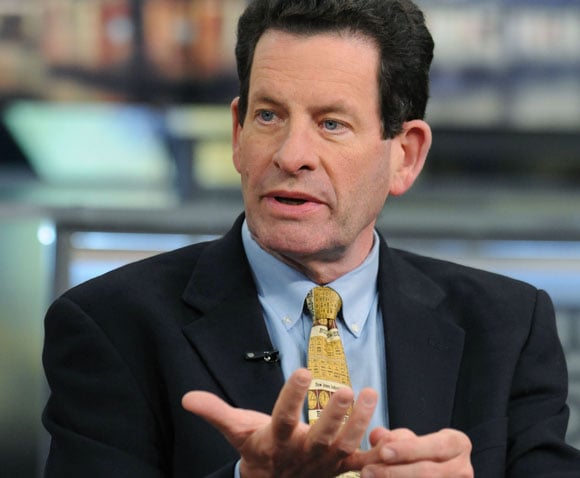The Standard & Poor's 500 Index may rally as much as 16 percent in the next six months because yesterday's election will stymie legislative initiatives in Congress, billionaire investor Kenneth Fisher said.
Equities have surged since July as odds that Republicans would take control of the U.S. House of Representatives increased. President Barack Obama and the Democratic Party pushed through reforms of the health-care and financial industries this year.
“Markets don't like big sweeping actions,” said Fisher, who oversees more than $38 billion at Woodside, California-based Fisher Investments Inc. “Right now, every politician is chirping and burping and carrying on. It's been in the interest of the Republicans running for office to talk down the economy. That goes away immediately after the election. Come June, you'll see how quiet the political landscape will be -- very little legislation and a lot of baby kissing.”
(Click here for an exclusive online special report on the results of the 2010 elections -- and the impact on advisers.)
Fisher's optimism is based in part on history. Stocks average gains of 11 percent in the third year of U.S. presidencies and haven't fallen since 1939 when the Dow Jones Industrial Average lost 2.9 percent, according to data since 1833 compiled by the Stock Trader's Almanac. The fourth year, when elections are held in November, is second-best, with an average advance of 5.8 percent.
‘Sweet Spot'
“Next year is the sweet spot,” Fisher said. “Most political risk aversion occurs in the first year when the president has the most relative power to the opposition party he will ever have. He tries to get through whatever his toughest bills would be, and that freaks people out.”
Obama's health-care reform reshaped the industry, extending coverage to tens of millions uninsured Americans. Signed into law by the president on March 23, it passed Congress without getting a single Republican vote. On July 21, Obama approved the most sweeping set of financial rules since the Great Depression, giving the government authority to unwind failing firms that may threaten the entire system, imposing rules on derivatives and creating a consumer-protection agency at the Federal Reserve.
After the health-care law was approved, the S&P 500 rallied to a 19-month high on April 23 before plunging 16 percent to a 10-month low on July 2. While it has since risen 17 percent to 1,193.57, the benchmark measure of U.S. shares has failed to surpass its April peak of 1,217.28.
Speculation that the Federal Reserve will try to stimulate economic growth through an asset-purchase technique known as quantitative easing has helped drive the stocks rally during the past four months. Fed policy makers began a two-day meeting yesterday, and economists surveyed by Bloomberg said the central bank will probably begin a new round of unconventional monetary easing by announcing a plan to buy at least $500 billion of long-term securities.
“Something on the low side of that might cause people to freak out negatively and something that's too big might cause people to freak out negatively,” Fisher said. “In a world where the U.S. economy is growing, I'm not sure why any of this makes any sense. In the long-term, money creation doesn't do anything but cause inflation.”







